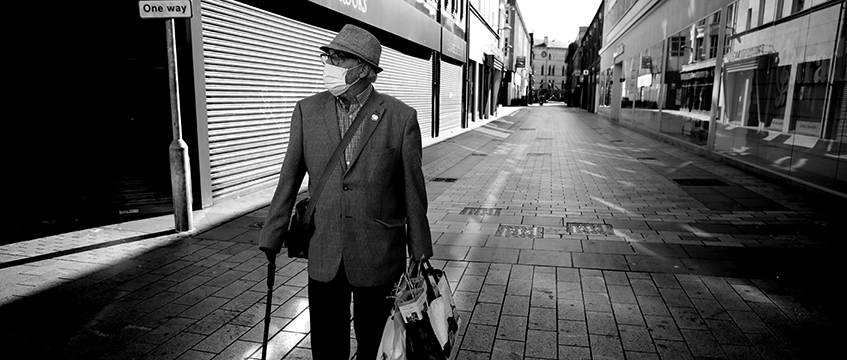The run-up to Christmas in Belfast looks to be a decidedly gloomy affair this year. Instead of its annual celebrity-led Christmas lights switch-on, the stately streets around Donegall Square will remain largely deserted as the event is replaced by “an alternative low-key programme”.
And yet, as Belfast’s main thoroughfares lie empty, the fight to keep the retail and office businesses at the heart of the city viable is intensifying – not least because the business rates from shops and offices in central Belfast pay for many of the city’s essential services.
“It’s an acute problem because the funding of local government in Northern Ireland is much more dependent on the direct relationship between the number of businesses that you have in your area and so the rate payment is coming straight into the council coffers,” Alistair Reid, strategic director for place and economy at Belfast City Council told a panel session during EG’s Future of UK Cities event.
“We do have concerns in terms of our ability to deliver long-term services if we don’t get this right” he says. “We benefit as an organisation hugely from having the right retail offer and also the right office offer. If the city centre doesn’t generate the rates that we currently enjoy then we will have to respond.”
Lost revenue
And it’s not just lost council revenue which is worrying. Without busy shops and offices, the city centre loses its vibrancy and becomes less attractive to other businesses and people.
Reid says that, as well as supporting retail and office tenants to remain operational during the crisis, the council is looking to the student housing and build-to-rent sector to maintain the city’s diminished footfall and plug some of its funding gap.
“We’ve been setting objectives around how do you regenerate and grow the city centre. Some of that is going to be around different usage,” Reid says. “We know a lot of retailers are not paying their rent or are in some form of negotiation around rent payment. A lot of office occupiers are seeking to renegotiate or demand shorter terms. But residential tenants are paying their rents so that gives us a good basis to seek funding in the residential area.”
Students hold the key
In the past five years, 3,500 students have moved into student accommodation focused largely around the city’s two major universities, while another 4,500 student rooms are already in the planning pipeline.
“There is now a demand for some form of city-centre living,” says Reid. “That hasn’t yet translated into a huge build-to-rent offer. However, that is happening at the moment and if you imagine that one-third of our students are leaving university every year then there are something like 1,700 to 2,000 young people who have an experience of city-centre living looking now for their next move.”
However, panellists admitted that the challenges remained steep.
“At this point we’re still very much in the hiatus,” says Gareth Howell, a divisional director for Savills in Belfast. “Once we get people back in the office we’ll see a more candid assessment of the issues around homeworking and the benefits of working in an office.
“One of the things that I think will come to the fore is a hybrid model of standard 10 or five-year leases supplemented with something that is a little bit more flexible.”
Northern Ireland’s transport operator Translink says it is reconsidering its fares model in the light of the crisis, with chief executive Chris Conway telling the panel it was “looking at all our types of tickets to see the best way to help people work more flexibly.”
And for retailers, the outlook appears even gloomier.
“I’ve probably got more lease re-gears on for retailers now at one go than I’ve ever had in my whole career,” says Mark Blair, a partner in Shoosmiths’ Belfast office. “I know some of them are fighting for survival. Some have just disappeared.”
Bankers too are finding it harder and harder to lend on pure retail covenants. “Retail was not without its challenges before Covid came along and that certainly hasn’t improved things so, from the bank’s perspective, it is very much under watch,” said Fionnuala Brennan, head of corporate property at AIB.
Nonetheless, the panel remained upbeat about the medium and long-term prospects for the city’s shops and offices, predicting that ultimately both would be able to bounce back.
“We need to find a way to attract more people into the city centre and that’s, I think, where some of the build-to-rent and some of the council masterplanning could come into play,” said Blair.
“A lot of the Northern Ireland economy is built on independent retail businesses. I just really hope they can keep going and take up space that some of the larger national retailers have left. I think that would be a positive thing even now.”
From his office in a decidedly un-festive Belfast City Hall, Reid agrees. “Through two world wars Europe has seen people abandon cities and then very quickly move back,” he said.
“I think the macro-view of cities is that that’s where people want to do business.”












